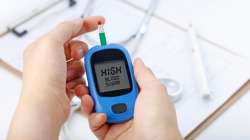COVID 19 FAQ: What's best for patients with diabetes, hypertension and heart diseases
The Indian Council of Medical Research (ICMR) answered a few important questions regarding the patients of Hypertension, Diabetes and Heart diseases and also burst the myths related to the same in view of the COVID-19 Pandemic. Have a look.

There has been a sharp surge in COVID 19 cases with the second wave of coronavirus gaining momentum. People have been struggling for beds in hospitals, injections and oxygen cylinders. On the other hand, the vaccination process is also taking place. However, it is said that people who are already suffering from diseases like hypertension, diabetes and heart problems are more prone to the Covid19 infection. Their body is susceptible to the virus and they need to take special measures to stay protected. As per the health experts, the coronavirus attacks the lungs in the most harmful ways. People have been questioning what to do in case they are patients of Hypertension, Diabetes and Heart diseases.
The Indian Council of Medical Research (ICMR) answered a few important questions regarding the same and also burst the myths related to Hypertension, Diabetes and Heart diseases in view of the COVID-19 Pandemic. Have a look.
Is there increased risk for patients with heart disease, diabetes or hypertension to get coronavirus infection?
As per ICMR, "people with hypertension, diabetes or heart diseases are at no greater risk of getting the infection than anyone else." While the majority of people infected by Covid19 make full recovery, some of the people with diabetes, hypertension and heart diseases including Heart Failure (weak heart) may develop more severe symptoms and complications.
Are people with diabetes more prone to Covid-19?
In general, you know that people with uncontrolled diabetes are at increased risk of all infections. People with diabetes are not at higher risk for acquiring the infection, but some individuals are prone to more severe disease and poorer outcomes once infected. Hence, follow your diet and exercise routine (to the extent possible), take your medications regularly and test your sugar levels frequently so as to keep your diabetes under control. When diabetic patients become sick, they may require frequent monitoring of blood glucose and adjustment of drugs including insulin, small frequent meals and adequate fluids.
What about reports about BP medications increasing severity of COVID-19?
After review of available information, the consensus of various scientific societies and expert group of cardiologists is that currently there is no evidence that the two group of drugs- ACE inhibitors (eg. Ramipril, Enalapril and so on ) and angiotensin receptor blockers (ARBs) (eg. Losartan, Telmisartan and so on) increase the susceptibility or severity of COVID-19. These drugs are very effective for heart failure by supporting your heart function, and controlling high blood pressure. It maybe be harmful to stop these medications by yourself. This can worsen your heart condition.
Which medicines are okay to take in view of COVID19?
ICMR suggests not taking painkillers, called NSAIDs, like Ibuprofen as they are known to be harmful to heart failure patients. Also, it may increase the risk of kidney damage. Avoid NSAIDs or take them only when prescribed by your doctor. To be safe, take paracetamolfor pain.
What should I do if I get symptoms suggestive of COVID-19?
In case you get fever, cough, muscle pain without shortness of breath, call your doctor and seek advice on phone. You need to stay at home for at least for 14 days and avoid close contact with other family members and maintain hand hygiene and correctly wear a medical mask.
If there is shortness of breath or worsening symptoms like excessive fatigue call/visit your doctor.
What should you do to prevent COVID19?
Covid-19 is spread by the exchange of droplets during coughs and sneezes and also through touch. When you touch an object that has virus particles on it, the virus may get onto your hands and when you touch your face, you may get infected. So it is important to not keep touching your eyes, nose or mouth. Virus particles can persist upto 3 days and therefore it is important to maintain hygiene of your surroundings. Wash the rooms, tables and other surfaces with floor cleaners or even simple soap solution and sanitize your hands with hand sanitizers or by washing when you touch unknown or suspicious surfaces.
Tips for those with diabetes, hypertension and heart disease:
- Make sure that you take all medications prescribed regularly as before even if you are mildly symptomatic. Continue with your blood pressure, diabetes and heart disease medications in case you are unable to visit your doctor.
- Keep your blood pressure (BP), blood sugar in control and do regular physical activity
- Avoid smoking and alcohol
- Follow the diet and salt restriction as advised. If you are a non-vegetarian, you can continue to be so. Increasing the fibre and protein content of the diet and more vegetables and fruits in diet is advisable